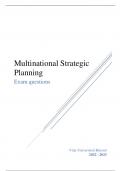Tentamen (uitwerkingen)
Multinational Strategic Planning - EXAM Questions + Answers
- Vak
- Instelling
- Boek
Got 16/20 with only this document. This document of the course Multinational Strategic Planning provides comprehensive coverage of key topics and exam questions of every chapter. It includes detailed answers and explanations for each question, ensuring a thorough understanding of the subject matt...
[Meer zien]





